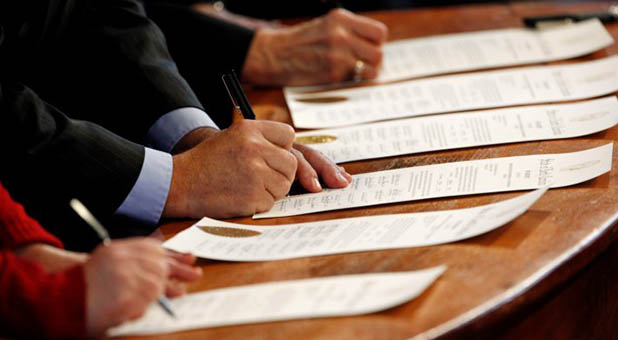The Electoral College Voted Its Conscience … And Hillary Lost (Again)
Electors in the 50 states and the District of Columbia gathered at their respective state capitols Monday and cast the votes that officially made Donald Trump the 45th president of the United States-elect and Mike Pence the next vice president.
Contrary to the liberal mainstream media’s narrative, nearly every Republican elector cast his or her ballot in alignment with each state’s popular vote. Of the 306 GOP electors slated to vote for Trump, 304 did so—the other two votes went to Ohio Gov. John Kasich and former U.S. Rep. Dr. Ron Paul (R-Texas).
Completely destroying the liberal narrative, however, were the seven Democrat electors who said they could not, in good conscience, vote for former Secretary of State Hillary Clinton. Here’s a rundown of each, by state:
Maine
David Bright used his position as an elector to send a political statement, he said. Noting that it was highly unlikely 37 Republican electors would change their votes to prevent Trump from winning the presidency, he first voted for U.S. Sen. Bernie Sanders (I-Vt.), Clinton’s opponent in the Democratic primary.
That vote was deemed “improper” because it violated the state’s laws that prohibit “faithless electors.” So, he ultimately voted against his conscience for Clinton.
“I had taken an oath to uphold the laws of the state of Maine,” the farmer from Dixmont said. “If I thought my vote could have helped Secretary Clinton to win the presidency, I would have voted for her on the first round …
“I can’t do anything to change the results of the election this year. But perhaps by encouraging these idealistic voters to stick around, I can change the results of elections to come.”
Colorado
On Nov. 8, Clinton won Colorado and its nine electoral votes. And, following a lawsuit challenging the state’s “faithless elector” law, the electors were instructed they had to vote for Hillary Clinton.
Still, Michael Baca refused and instead voted for Kasich. That vote was rejected, and Baca was immediately replaced by Secretary of State Wayne Williams to a chorus of boos from observers in the gallery.
Baca’s replacement, Celeste Landry, cast her vote for Clinton.
Minnesota
With protesters frequently disrupting the gathering of the electors in Minnesota, another state Clinton won on Nov. 8, there was a bit more chaos than usual at the quadrennial event where the Gopher State’s votes for president were made and counted. But the biggest surprise came when one of the electors announced he could not vote for the former secretary of state.
Since 2004, when a faithless elector voted for John Edwards instead of John Kerry for president, state law has mandated that electors must vote in accordance with the state’s popular vote. But Muhammad Abdurrahman voted for Sanders instead of Clinton, nullifying the first ballot.
Secretary of State Steve Simon chose a replacement for Abdurrahman. That replacement, who was not identified by local media, voted for Clinton. Afterward, Simon—a DFLer, the state’s designation for Democrats—said he had no advance notice of the faithless elector but had planned for the possibility.
Minnesota is one of several states considering legislation that would tie its electoral votes to the outcome of the national popular vote, effectively circumventing the Constitution.
Washington
Bret Chiafalo, who founded the Hamilton Electors group in an effort to urge Republicans to ditch Trump, was one of four Democrat electors in Washington state who became actual faithless electors by voting for someone other than Clinton. In Chiafalo’s case, he voted for former Secretary of State Colin Powell—a Republican.
He was joined by two of his colleagues, Levi Guerra and Esther John. Originally, they planned to vote for Kasich, but instead chose someone with “strong national security credentials” amid the current Russian hacking allegations.
Robert Satiacum, a member of the Puyallup Tribe of American Indians, voted for Faith Spotted Eagle, the Yankton Sioux tribal elder who is leading the protests against the Dakota Access Pipeline project. His vote was an actual objection to Clinton, whom he said was a “crook” who had “her hands in the cookie jar.”
“We did what we thought was necessary to take a stand,” Chiafalo said. “Whether we won or lost—and obviously, we lost—it doesn’t change the fact that we were standing up and doing the right thing.”
Don’t hold your breath waiting for the liberal elites of Hollywood to express their outrage that Democratic electors were forced to vote against their conscience. Instead, expect these faithless electors’ efforts to be spun into a new round of arguments about why the Electoral College should be abolished.
For the rest of the country, however, it simply reaffirmed the framers knew what they were doing when they created it.
After winning the Electoral College vote, Trump issued the following statement:
Today marks a historic electoral landslide victory in our nation’s democracy. I thank the American people for their overwhelming vote to elect me as their next president of the United States. The official votes cast by the Electoral College exceeded the 270 required to secure the presidency by a very large margin, far greater than ever anticipated by the media. This election represents a movement that millions of hard-working men and women all across the country stood behind and made possible. With this historic step, we can look forward to the bright future ahead. I will work hard to unite our country and be the president of all Americans. Together, we will make America great again. {eoa}
















































